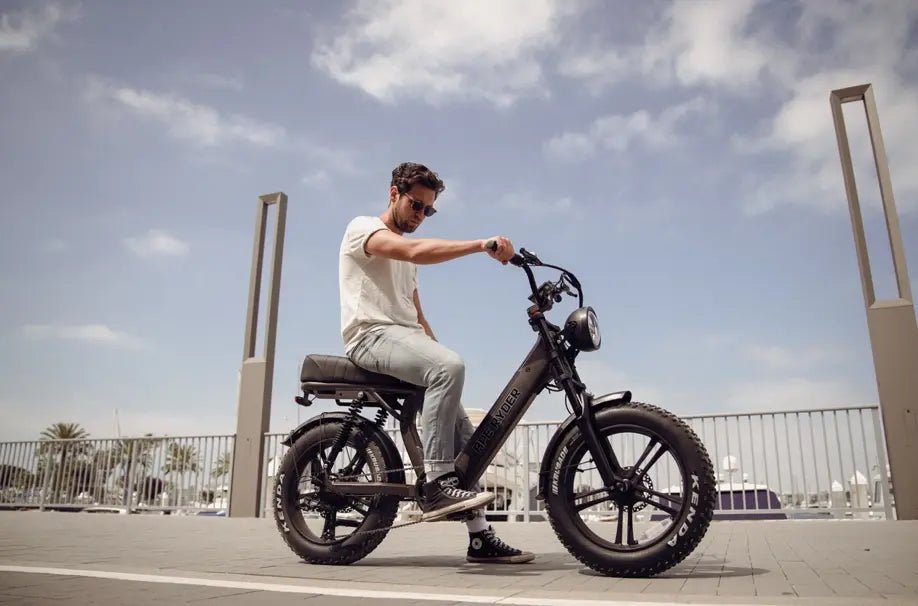Tired of wasting hours every day waiting in traffic or looking for a parking spot? If you are an urban commuter, you must have wondered about other alternatives for getting around in a city. Then comes the e-bike—the modern invention that is changing the way humans will think of transportation. But how does it compare to a traditional car?
The Cost Factor
Affordable
E-bikes remain at the top concerning their initial outlay. The average e-bike is between $1,000 and $3,000, while a new car can be from $20,000 to $40,000 plus or more. But wait, there's more: e-bikes also have lower operating costs. Fuel, premium parking fees, or heavy insurance premiums aren't going to break your stack of expenses. Plus, the maintenance is super simple and much cheaper.
On the financial side, e-bikes are quite impressive in terms of long-term savings. Less to be concerned with, compared with cars, which require frequent servicing. For the keeping expenses low, the e-bike doesn't have any competition.
Hidden Expenses for Cars
Cars bring various hidden costs with them. After buying the vehicle, one has to consider fuel, insurance, and regular maintenance. The value of the car decreases with time. Let's not forget that in most towns and cities, parking involves money and even frequent fines. All these factors add to the more expensive option of cars for daily commuting.
However, cars have the advantage that you are able to get different many financing options for your purchase; this is, however, much rarer in e-bikes. Again, financing options would eventually place people in ownership of a car as an achievable thing; however, these are pretty costly in the long run through interest repayments.
Convenience and Time-Saving
Traffic Time is Saved by E-Bikes
Picture yourself zipping through the traffic, missing all of those jams, and reaching your destination faster. E-bikes provide exactly that. They cut their way out loose among busy streets, bike lanes, and just a little off-roadwork if need be. Unlike cars, e-bikes have no restrictions due to traffic laws made up for larger vehicles. So, they are a brilliant idea to ride around the city, where the daily norm is congestion.
E-bikes allow your daily commute to be more predictable: no long lines of cars in front of you and no waiting around for a parking spot. You will know precisely how much time your ride is going to take, and that makes planning your day easier.
Cars Offer Comfort and Space
While e-bikes grade A in convenience in densely populated city locations, cars have their own set of benefits when it comes to longer commutes or trips that require carrying lots of items. They offer climate control, comfortable seating, and large storage space—rather suitable for long drives, inclement weather, or when you need to transport groceries, kids, or equipment.
All this comfort, however, is exchanged against the hassle of traffic, finding a parking spot, and filling up at a fuel station, which requires so much time and effort. If your urban commutes are short, the time you save by riding an e-bike often outweighs these comfort benefits.
How E-Bikes Affect the Environment
E-Bikes Are Environmentally Friendly
For eco-conscious commuters, no-brainer: clear winner, e-bikes. They run with zero emissions, greatly lightening your carbon footprint. A mere rechargeable battery powered by minimum electricity, not contributing to air pollution, can work wonders on an e-bike. In fact, estimates show that switching over to an e-bike for daily commutes can cut up to 90% of transportation-related carbon emissions.
Moreover, an e-bike is constructed from basically recyclable material and also does not need intensive production processes as in the case of cars. If you are interested in sustainable solutions, then an e-bike will suit you just fine.
Cars Contribute to Pollution
Even after the introduction of fuel efficiency and hybrid technology, cars still take a big toll on the environment. They emit greenhouse gases and pollutants into the atmosphere, thereby contributing to air quality problems and global warming. The worst impact of the emissions from vehicles is in urban areas, leading to health complications and a decreased quality of life.
While electric cars are much more of a sustainable alternative, they are very intensive in resources to make and consume. Moreover, most of their charge actually is derived from non-renewable sources. E-bikes win in the eco-friendliness warfare.
Health Benefits
E-Bikes Get You Moving
Riding an e-bike is not only good for the environment but also excellent for your health. Most importantly, e-bikes do allow and promote physical activity for cardiovascular health, muscle strength, and general fitness. Yes, there is an electric motor that assists pedaling, so you will still be getting adequate exercise, especially on longer rides or hilly terrain.
Regular use of the e-bike can help you stay active, handle stress, and feel good mentally. Some of those who feel that traditional biking is going to be too strenuous do find e-bikes to be a good middle line between exercise and convenience.
Cars Encourage Sedentary Lifestyles
In sharp contrast, cars are sedentary. Long hours spent sitting in cars put one in danger of developing many diseases: obesity, cardiovascular diseases, and back aches, to mention just a few. Cars do not get a user to exercise their bodies; on the contrary, they are very comfortable. If your key interest is health and fitness, e-bikes give clear advantages.
Safety Considerations
Pros and Cons of E-Bikes
The choice between e-bikes and cars is also based on safety factors. E-bikes are much smaller and their speeds are considerably lower compared with cars; thus, they can cause less severe accidents than cars. On the other hand, e-bike will bring in many risks and risks can be minimized if a rider wears a helmet and follows the traffic rules.
E-bikes have better safety precautions too and many of them having lights, reflectors, and bells to give you a sound and clear vision down the road. Users can also buy some safety accessories of reflective clothing and gloves to ensure their safety.
Cars Provide Strong Protection
Cars offer a lot more protection with airbags, seat belts, and crumple zones. All of these tools are there to absorb impact in a collision. Which is to say that they are a lot safer in an accident. Still, cars have more severe kinds of accidents due to the speed factor and that they are bigger in size.
While cars certainly provide a greater level of protection, they also represent a much greater threat to pedestrians and cyclists. All these factors must be balanced with convenient and cost considerations as you make your decision.
Flexibility and Versatility
E-Bikes Are Highly Versatile
One of the most significant advantages of e-bikes is the versatility of their use: for work commuting, leisure riding, or even carrying light cargo. More and more frequently, e-bike models come with racks and baskets, even including child seats, and become very effective for almost any occasion. Being light, in turn, easily allows you to take them along on public transport or store them in small spaces. From waterproof designs to strong tires, e-bikes ride well in literally any weather and are reliable for everyday commutes throughout the entire year. Cars are far more flexible.
Cars might offer unmatched versatility in long-distance trips or family outings where a lot of luggage is involved. They function over both smooth and rough terrains and all types of weather conditions. If one travels a lot of distance very frequently or if someone has a larger family, cars might be more practical.
This, however does come at a more significant cost and with more environmental damage. Weighing these factors up with your specific needs will then enable you to see which option is more applicable.
Community and Social Impact
E-Bikes Connect Communities
One thing that is typical when riding an e-bike is the feeling of closeness to your community. For certain, you will be more likely to have interactions with other cyclists or pedestrians, which gives you a sense of connection and camaraderie among people. Most cities have active cycling communities with different events, group rides, and advocacy work in bettering bike infrastructure.
In addition, t is also satisfying to be in a cycling community in the sense that one gets to be with others of common interests and also gain from social activities. This to itself is a unique benefit that the e-bike can present.
Cars and Social Isolation
On the contrary, cars make people socially isolated. When driving one is commuting individually and therefore is limited to the exposure and relationship building that is accomplished. With the same qualities of privacy and comfort that cars possess, cars do not render their riders with the social engagements that e-bikes do.
However, cars do allow us to go over long distances—for example, to see our friends and relatives. The key is balancing the convenience of car travel with the social payoffs of more active transportation.









1 comment
Acciva Travels
An engaging comparison of e-bikes and cars for commuters! This article is a great resource for making eco-friendly travel choices.
Leave a comment
All comments are moderated before being published.
This site is protected by hCaptcha and the hCaptcha Privacy Policy and Terms of Service apply.